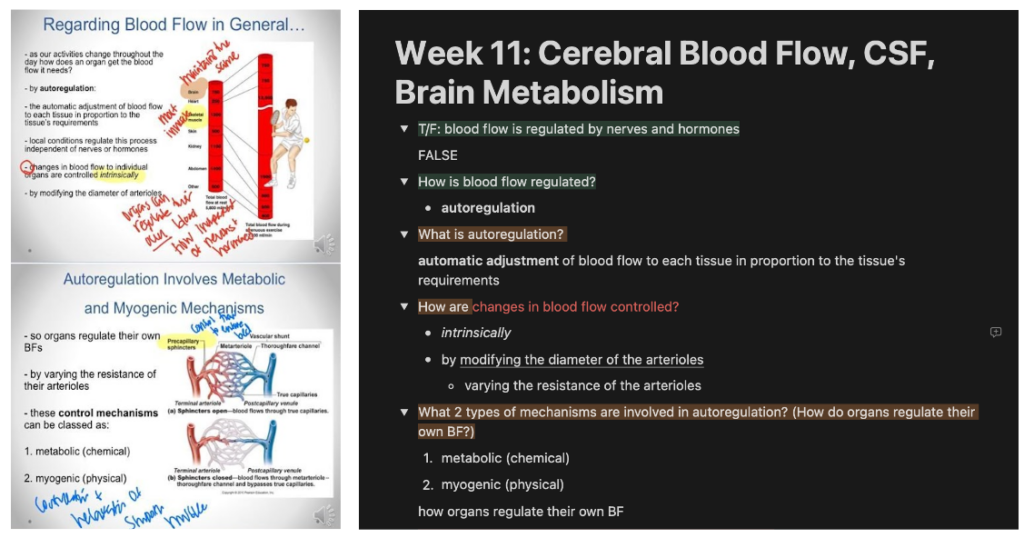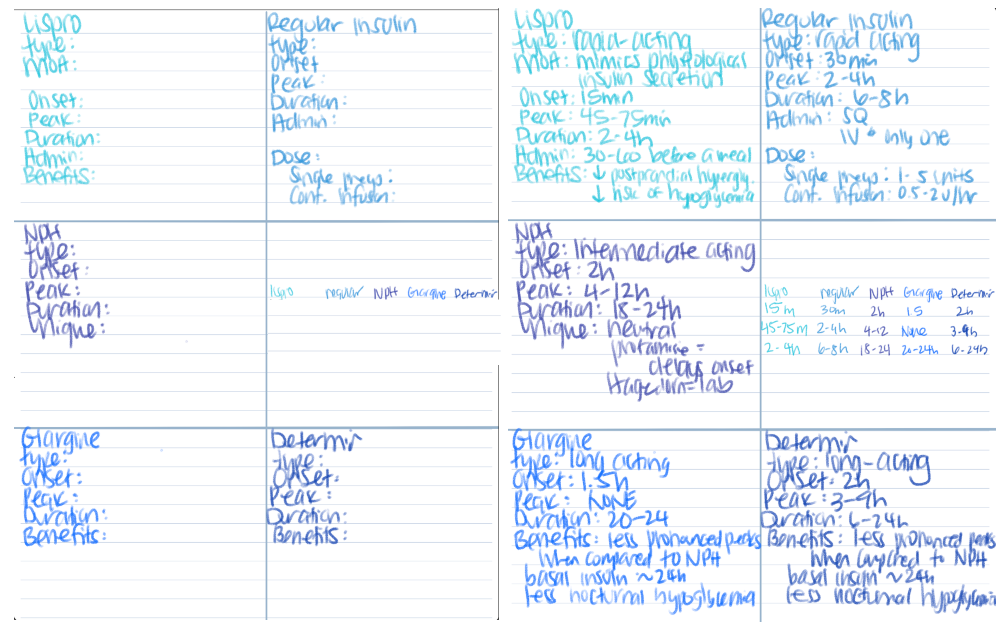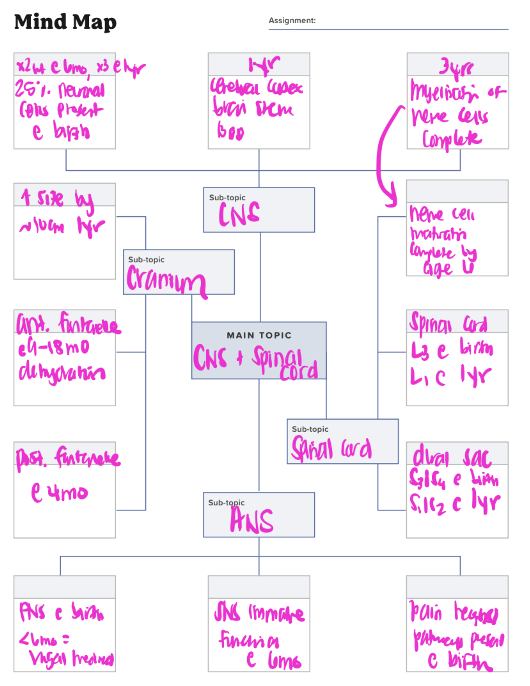How to Manage Online Classes for CRNA School and Staying Motivated
I remember being asked during my CRNA school interview, “how will you handle our online classes?” To be completely honest, at the time, I had no idea what they were talking about. I knew that there would be some online components, but I didn’t realize that the majority of my classes would be online, and asynchronous at that. Asynchronous classes for my program meant that our pre-recorded lectures would be posted online for us to view at our own time each week, and we would show up on campus for the exams. So, there was no one to force us to go to class or watch the PowerPoints on a certain day/time. This took some serious discipline! I’m here to provide you some tips and tricks to help manage these asynchronous classes and stay motivated.
Step 1
Calendar - map out each week (my fav for this was using a whiteboard calendar that I should easily change out each month!)
The first thing I would do at the start of a semester/quarter, is write out all the due dates for assignments and all of the exam dates. From there, I would work on a weekly calendar to focus my time. One of the biggest tips I have for asynchronous classes is to split up the workload into bite-sized chunks. It can be overwhelming to try to plan for 3 or 4 classes every week, but I found a method that worked for me (and that hopefully works for you too).
Step 2
Breaking up lectures (my fav for tracking this was using Notion’s online weekly calendar template!)
Something that really made me appreciate asynchronous classes was the fact that I could break up the lectures into multiple days. My Physiology lectures would sometimes be 3-4 hours long! As someone who has a hard time sitting still for extended periods of time, my asynchronous classes actually worked in my favor.
I would split my days up into hours, and then split my hours up into focusing on each class for that allotted time. Breaking up the material into these easily digestible pieces really helped me stay motivated and made the material less overwhelming. For example, I would listen to hour 1 of my Physiology lecture on Monday and take notes on it in Notability, then the second half Tuesday (and the third part Wednesday - some lectures will be that long).
Then, in my second block of studying Phys that day, I would make questions and answers out of the material you already listened to. Do that for all your classes. Get through at least (2) 1hr blocks of each class every single day. every third hour, take a longer break (ex: an hour for a lunch break), then right back into it. That’s at least 6 hours of studying a day. If you can do more, do more. I started cutting myself off around 7-8pm each day because I was so exhausted and wasn’t retaining any of the info.
For me personally, I realized studying after 8pm was not beneficial. I would get too tired and burnt out. Instead, I would take an hour to watch a TV show I liked or do my nails or catch up with friends. There comes a point where it’s not beneficial to stay awake to try to finish something. Your sleep is of utmost importance!
Real life example – You can format a table in Word, or find templates on Notion or Notability, or even use Google Cal/To-Do list, etc etc.
| Time | Monday | Tuesday | Wednesday | Thursday | Friday |
| 8-9a | Physiology: Listen to Hour 1 of Lecture | Physiology: Listen to Hour 2 of Lecture | Physiology: Listen to Hour 3 of Lecture | Wash, rinse, repeat | Wash, rinse, repeat |
| 9-10a | Pharm: Listen to Hour 1 of Lecture | Pharm: Listen to Hour 2 of Lecture | Pharm: Active recall on questions made | ||
| 10-11a | POA: Listen to Hour 1 of Lecture | POA: Listen to Hour 2 of Lecture | POA: Active recall on questions made | ||
| 11a-12p | Sim Lab: Write out machine checkoff steps from pre-recorded video | Sim Lab: Write out machine checkoff steps from memory | Sim Lab: Write out machine checkoff steps from memory | ||
| 12-1p | LUNCH | LUNCH | LUNCH | LUNCH | LUNCH |
| 1-2p | Physiology: Make questions from Hour 1 of Lecture | Physiology: Make questions from Hour 2 of Lecture | Physiology: Make questions from Hour 3 of Lecture | ||
| 2-3p | Pharm: Make questions from Hour 1 of Lecture | Pharm: Make questions from Hour 2 of Lecture | Pharmacology: Active recall on questions made | ||
| 3-4p | POA: Make questions from Hour 1 of Lecture | POA: Make questions from Hour 2 of Lecture | POA: Active recall on questions made | ||
| 4-5p | Sim Lab: Write out machine checkoff steps from memory | Sim Lab: Practice in Sim Lab | Sim Lab: Review machine checkoff out loud with a friend | ||
| 5-6p | DINNER | DINNER | DINNER | DINNER | DINNER |
| 6-7p | Physiology: Create tables/cheat sheets for comparison | Physiology: Create tables/cheat sheets for comparison | Physiology: Active recall on questions made | ||
| 7-8p | Pharm: Create tables/cheat sheets for comparison | POA: Create tables/cheat sheets for comparison | Pharm: Quiz yourself on tables/cheat sheets |
Helpful Materials and Apps for CRNA School:
Spaced repetition
- Notion or Anki for spaced repetition
- Turn PowerPoints into questions (post an example)
- Ali Abdaal on YouTube for how to setup Anki, as well as how to use Notion
- I highly recommend watching these videos and getting acquainted with which study methods you are going to implement before you begin the program! It will be difficult to learn a new system while also learning all the information CRNA school throws at you
- In Notion, you can color-code the questions based on their difficulty (ex: green = easy, orange = medium, red = difficult) similar to how Anki has their spaced repetition buttons
Example:

Cheat sheets
- Notion!! It is super easy to make tables for quick comparisons.
- You can then download them as PDFs and import into Notability to study/reference
Example:
Make study materials that make sense for YOU
- Notability has a ton of pre-made templates, I loved these flashcards.
- Here’s an example of what I did for Pharm to help memorize certain meds that fell into the same category. Make the outline, then write the column on the right from memory. Do this over and over. Active recall will work for every class. You just have to find a way that makes sense for you to recall it. For me, it was writing it over and over. With a mix of spaced repetition from Anki flash cards as well.
Example:

Mind maps for bigger concepts
- Also made with Notability
Example:

Whiteboard
- Writing out concepts to refer to throughout your studying
Extra:
- If you school has you purchase APEX, you can cross reference some material
- Word of caution here: typically, form my experience, the exams are straight from the lectures, and not so much APEX. APEX might have easier ways to remember concepts, but the exams typically reflect the wording from the lectures themselves
Staying Motivated
- Find/curate a study playlist on Spotify. I personally couldn’t listen to songs with lyrics (because I would get too distracted), so I found playlists that had popular instrumental pop songs (highlyyyy recommend!)
- Switch up your study location every so often. I made it a habit to check out a new coffee shop each week to help keep me motivated. It’s so easy to get stuck in the house, and when you’re at your desk for 8+ hours a day, it can get hard to want to wake up and go right back to the same place. Libraries are another great option! Even doing something like moving to the living room and/or dining room is helpful. You don’t *have* to spend money to go out to study, but a coffee/treat is nice very once in a while to keep that motivation up.
- Self-Care!!
- Always have something to look forward to on your schedule/calendar. Example: Book a spa day! You deserve it,
- I also tried to keep 1 weekend day open per week for fun/spending (uninterrupted) time with friends and family.
- Schedule in workouts/walks
- I would work on my active recall 1 hour an evening via the Anki app while I was walking! I even listened to music in the background to keep me pump (I owe a personal thanks to Taylor Swift for getting me through these!!)
- Night before an exam:
- Call it quits on studying early tonight and do something for self-care (take a bath, watch an episode of your favorite tv show, paint your nails, do a face mask, etc etc) do something for YOU tonight! And make sure you get a good night’s sleep
- Reminder: You are handling the material in a way that works for YOU. It is SO hard not to compare to others, I get that. I stopped asking people what they were studying/which PowerPoint they were on or had finished, what their exam scores were, etc etc. Comparison will only tear you down!
- Fitting more “fun stuff” into your schedule will come easier and easier as you progress through the program and refine your study techniques. You’ll be able to recognize what works for you, what doesn’t, and how to adapt.
Some Pro Tips (Things I wish I did):
- Once you start learning about medications in Pharm, make a master google spreadsheet or Excel doc with all the info so you can revisit it later
- Super helpful for sim lab and careplans!
- Label any and all of the charts you make, and save them in a Google drive according to the topic
- This will come in handy for SEE studying! No need to re-create what you already made
- If you use a whiteboard to write out notes, take pictures of them and save those too and label them accordingly for easy searchable reference
- Once you start learning about the brachial plexus and any regional blocks, take DETAILED notes and keep that info FOREVER (I swear it comes up almost every quarter)
- TikTok and/or YouTube videos for things that just aren’t clicking
- I found some great ones to help explain drawing and memorizing the brachial plexus in 60 seconds – you’d be surprised at how many people out there have already developed mnemonics and other ways to help make concepts easier to remember!
- Ask to meet 1:1 or small group with your instructor to go over certain topics you’re not understanding
- I did this a few times virtually via Zoom with my instructor and it helped clear up some confusing concepts.
- And, if you haven’t already, ask your classmates if they understand a specific topic! You’ll soon see that each person is really well versed in specific areas that you may not be and vice versa. Hearing someone else explain concepts can definitely be helpful as well.
For more in-depth guidance, don’t forget to listen to The CRNA Club Podcast. Your future as a CRNA depends on your professionalism—make sure you stand out for all the right reasons!
tune in weekly as we serve up insight into the crna profession, application hot tips and interviewing prep. we dish our juiciest (and best) stuff here.
featured episodes
The One Thing That Will Change Your Entire Application Journey
Making the Most out of Your Year in the ICU
What Should You Really Care About When Choosing a CRNA School?
Your Secret Weapon When Applying to CRNA School
